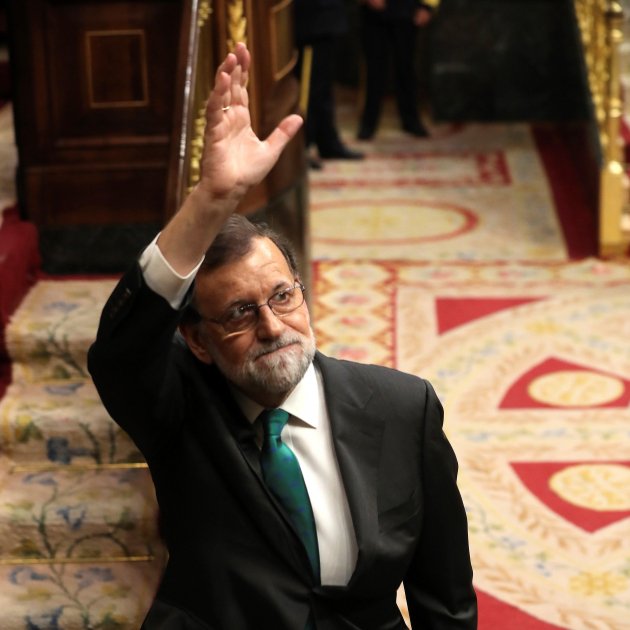Mariano Rajoy, the subject of every front page this Friday. The now former Spanish prime minister was facing down what would be his last day in the office. The motion of no-confidence brought by Pedro Sánchez passed with 180 votes from PSOE, Podemos, EAJ, EH Bildu and the pro-independence Catalan parties ERC and PDeCAT.
It was precisely this unusual mix of parties joining forces against the prime minister which the Spanish press turned their noses up at, adopting Albert Rivera's epithet for it: "Frankenstein". For ABC it even made their headline: "EAJ gives birth to Frankenstein and Rajoy doesn't resign".
Frankenstein's monster is, as you're aware, a fictional being created from body parts from different corpses, Frankenstein actually being the name of the character who created the monster and not the monster itself. That's what ABC sees when they look at the parties who joined forces to oust Rajoy.
"Rajoy doesn't resign," they add. Indeed, the numbers were already known yesterday, but he decided to see it through to the bitter end. Thus, for the first time in Spanish history, a prime minister was forced out of office by the opposition, a new prime minister who didn't come straight from the ballot boxes and who doesn't hold a seat in the Congress took office and the prime minister isn't from the largest party.
The paper admits that PP has been "knocked out cold" by the motion, but also attacks the nationalist parties who it says have betrayed Spain. It adds that PSOE is now "accepting the price of making Sánchez president". The price, they say, of "courting the secession movement and accepting the budget they scorned".
La Razón doesn't blame Rajoy or the Gürtel sentence either for the prime minister's exit, despite it being in response to the sentence that PSOE brought the motion. They say that what actually took down the prime minister was "chaos". That said, they don't specify if this chaos is the Frankenstein that ABC see, or the chaos of the different corruption scandals swirling around the PP, or even something else.
Their editorial clarifies their position a little: "It's not Rajoy's resignation, it's Sánchez's ambition". They then openly attack the new prime minister: "Reality is stubborn and has again demonstrated, step by step, what only the most sceptical about Pedro Sánchez's political and moral quality knew would happen: that he would do everything possible to be prime minister. Whatever it cost. Whoever supported him. Whatever he agreed."
For their front page, La Razón went with one of the photographs which has caused the most frenzy, and which best illustrated the expectations for Rajoy's last day: the Spanish prime minister bidding farewell to the Congress on Thursday. He then spent the whole afternoon and evening in a restaurant with his team and various ministers instead of returning to the debate on his future.
Finally, El Mundo takes a similar line, describing the government Sánchez proposes as reckless: "Rajoy refuses to resign and enables Sánchez's reckless government" reads their headline.
The paper's editorial nods to Machiavelli's thesis that for success, a prince needs both fortune and virtue. It seems that El Mundo don't find Sánchez's new government particularly virtuous, being the "fruit of the treacherous embrace that PSOE has received from populists and independence supporters".
